African Centre for Leadership, Strategy & Development
African Centre for Leadership, Strategy & Development
Home » Projects » Development Projects » Do Mining Right

Nigeria is endowed with over 44 solid minerals distributed across the 36 States of the country. The Federal Government of Nigeria (FGN) has identified seven strategic minerals – Coal, Bitumen, Limestone, Iron Ore, Barites, Gold, and Lead/Zinc – as development priorities. Mineral mining in Nigeria, which is increasingly gaining government policy attention, dates back to 1902 when the first official mining activity in Nigeria commenced with the exploration of Tin ore. Mining of other minerals including, Columbite, Coal, Lead, and Zinc, followed and contributed significantly to Nigeria’s GDP and industrialization.
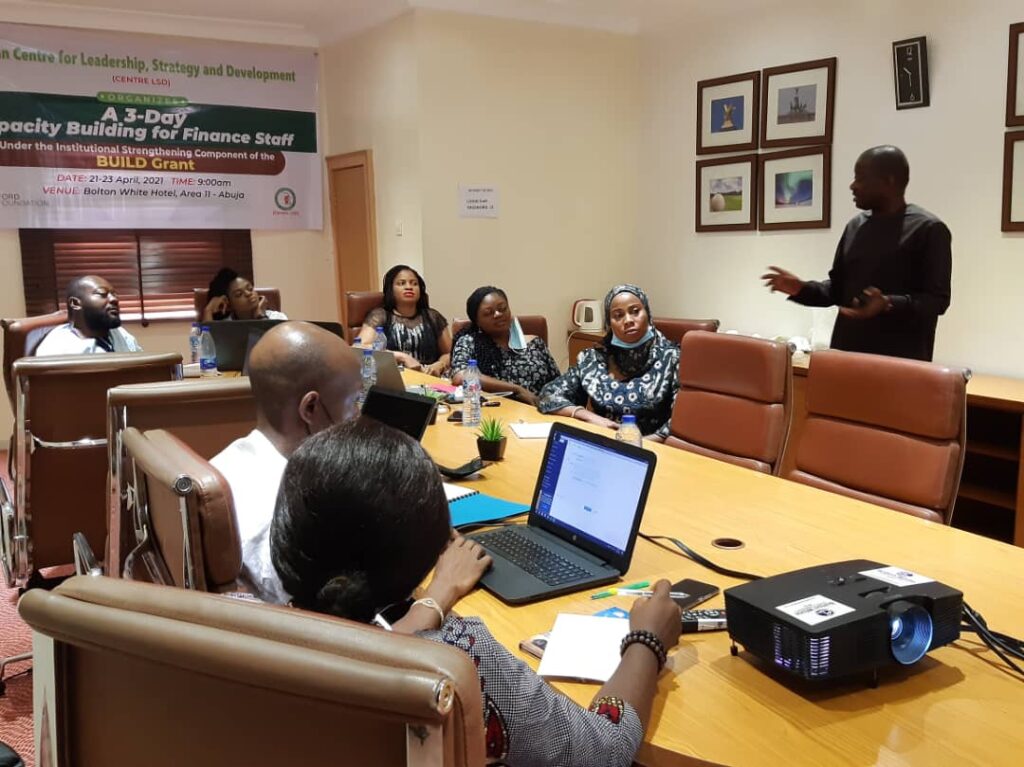
Before independence, Nigeria was popular for the production of large quantities of coal for energy generation, railways, and export. The export of Columbite, Tin, Lead and Zinc was also common. However, the discovery and emphasis of crude oil production in the 1970s led to a significant decline in the development of the solid mineral mining industry. The nationalization policies of the 1970s and 1980s further worsened the state of solid minerals mining in Nigeria. Many foreign investors exited the industry due to poor operating conditions, which set the industry on a downward spiral evidenced by the massive drop in solid mineral’s contribution to Nigeria’s GDP and export. For instance, in the early 1980s, solid minerals contributed roughly 1.2% to GDP, which declined to about 0.12% as at 2012.
The oil price crisis of 2014, which severely strained Nigeria’s finances and foreign exchange earnings, inspired an urgency to diversify Nigeria’s economy away from oil as the major source of government revenue and foreign exchange earnings.
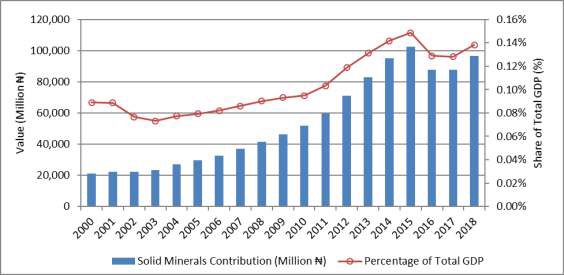
Contribution of Solid Minerals to GDP
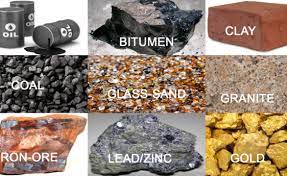
This, amongst other things, led to a renewed interest to develop Nigeria’s solid mineral industry as a major employer of labor and a reliable source of tax and foreign exchange revenue. The federal government of Nigeria is continually improving the industry’s regulatory framework to encourage private investment. These are laudable efforts given that solid minerals can contribute significantly to the industrialization of Nigeria: numerous high value products can be derived from the industry’s value chain, although the adequate infrastructure is necessary to enable such value chain development. Despite the ongoing efforts, the solid minerals industry still contributes very little to Nigeria’s GDP and export, although there have been modest improvements over time. Figure 1 shows the annual contribution of the solid minerals industry to GPD between the year 2000 and 2018. While the industry contributed about 0.09% in 2000, the value increased to roughly 0.14% in 2018, although there were years of moderate decline, notably 2004 and 2016. Across the board, it can also be seen that the real value (in million naira) created by the industry has generally risen over the years in line with the ambitions of the government. While the industry generated roughly 21 billion of real GDP in 2000, the value more than quadrupled to roughly 97 billion by 2018.
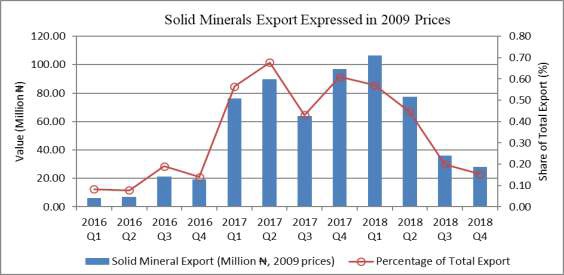
Foreign Exchange Earnings from Solid Minerals
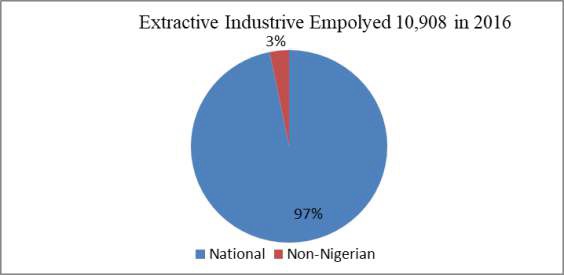
Employment in Solid Minerals Extractive Industry
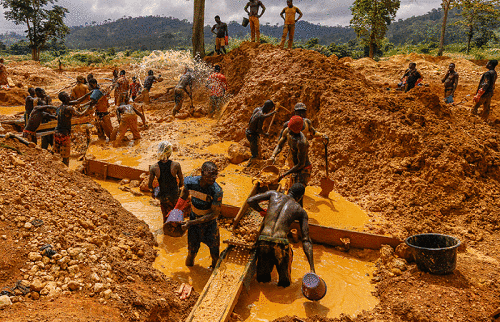
Like other States in Nigeria Ebonyi, Ekiti and Taraba States – the focal points of this study – have a number of solid mineral deposits. Table 1 shows the solid minerals in each of the States and these States have at least one of the strategic minerals identified by the federal government for development. The wide array of minerals across the three States is exemplary of the rest of the federating States in Nigeria: different sets of mineral deposits are in different States, creating an opportunity for a robust solid mineral ecosystem in Nigeria as a whole.
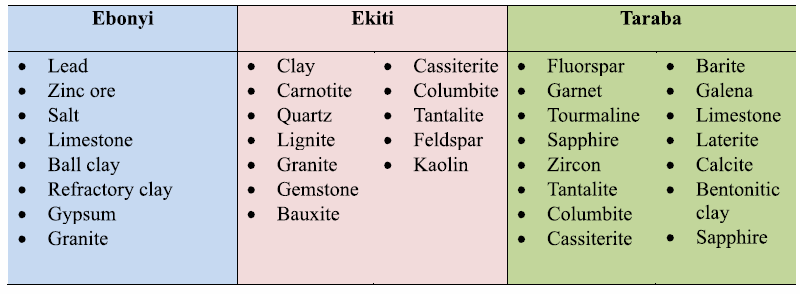
Source: NODAC Consulting; Based on the Nigerian Metal and Mining Investment Promotion Brochure 2017s
The main laws regarding the environment and mineral mining activities in Nigeria are the 4 Environmental Impact Assessment (EIA) Decree No. 86 of 1992 and NMMA 2007. The EIA Decree mandates the Ministry of the Environment to complete a pre-construction
review of activities raising environmental concerns. Similar to the provisions of Section 119 of the NMMA 2007, the EIA Decree prescribes that EIAs must contain detailed description of activities to be undertaken, the potentially affected environment, and the practical alternatives, together with an assessment of likely or potential environmental impacts, identification and documentation of mitigation measures, and an indication of gaps in knowledge. Requirements in the EIA Decree specific to the mining sector and activities include a surface infrastructure plan (to include a water pollution management), and surface water, groundwater, and air pollution analysis. The Federal Government of Nigeria, in 2007, also created the National Environmental Standards and Regulation Enforcement Agency (NESREA) Act, which replaced the Federal Environmental Protection Agency (FEPA) as the primary law governing environmental protection.
Mining operations must also comply with related environmental regulations that go with the environmental laws and policies. These regulations are established and administered by the Ministry of the Environment through NESREA. Through the instrumentality of the NESREA Act, the Ministry of Environment is mandated to pass regulations to protect public health or welfare. One of such regulations related to the mining sector is the regulation put in place in 2009 to govern Pollution Abatement in Mining and Processing of Coal, Ores and Industrial Minerals. These sets of regulations target the minimization
of pollution from the mining and processing of coal, ores, and industrial minerals and contain emissions limits for specific pollutants, among other things.
Our field surveys in Ebonyi, Ekiti and Taraba States show that many mining investors are aware of the range of environmental risks that mining activities pose to the communities where such activities are ongoing. For instance, these mining investors point to the Lead poisoning of water sources such as rivers and streams, and how this may lead to serious public health problems. Another point is the risk of erosion resulting from the existence of several mining pits, and felling of trees in mining sites which exposes the topsoil to erosion. Representatives of regulatory agencies at the State level that were interviewed acknowledge glaring evidence of health risks posed to the communities by mining activities in the States. Their revelation shows that while they are aware of these environmental issues, enforcement has been largely weak. For instance, a government representative in Taraba State added that miners are being encouraged to close up pits as soon as they leave the sites. However, not much of this is done in very many cases. Regulators also blame the artisanal miners for most of the poor environmental practices that happen in affected communities. The regulators do not mention any strict enforcement measures taken against either artisanal miners or major mining operators or investors.
Mining investors raise the point about the environmental risks associated with their mining operations in the affected communities without a mention of the areas where they are taking precautions to ensure that the impact of their activities in the sites is mitigated. The NMMA 2007 imposes responsibilities on mining permit holders to ensure that the mining environment is restored during or after mining activities have been completed in mining sites.
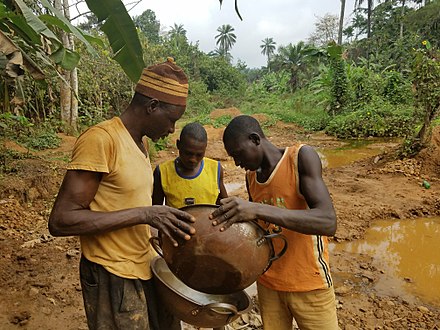
Centre LSD Advocacy visit to Ire Clay Products Limited. The Executive Director Mr Monday Osasah was flanked by the General Manager Mrs Bridget Obube, the management staff of the company, Chairman Miners Association of Nigeria Ekiti State, Chairperson Women in Mining Mrs Yemisi Ajisafe and others
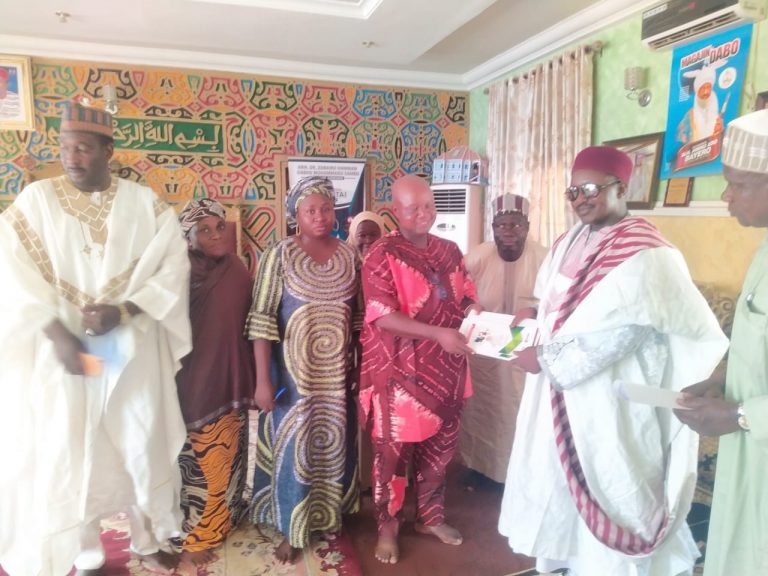
Presentation of Centre LSD research report on the Solid Mineral Development in Nigeria: Evidence from Ebonyi Ekiti and Taraba States with support of OSIWA to the Lamdo Gashaka by the Executive Director Centre LSD Mr Monday Osasah
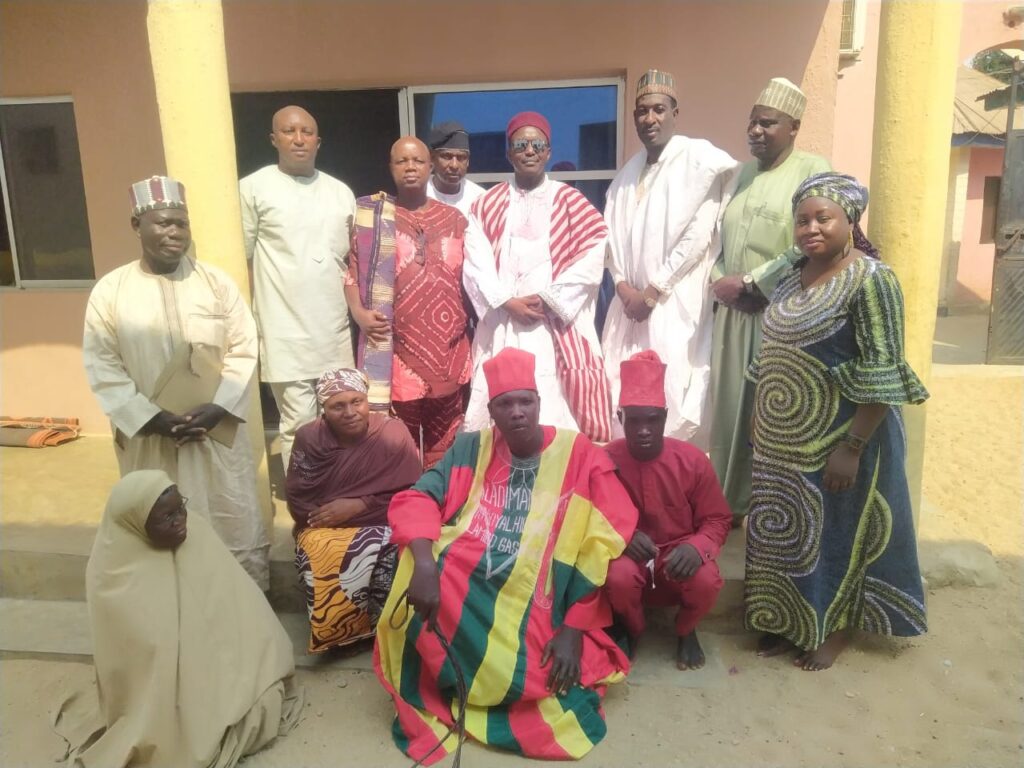
Centre LSD advocacy visit to the Lamdo Gashaka HRH Dr Zubairu Hamman Gabdo led by the Executive Director Centre LSD earlier today at the Lamdo’s palace in Gashaka. SSA to the Taraba state Governor, Mohammed Idi Mai-Iyali, Miners Association of Nigeria Chairman Taraba chapter, Abdulkarim Maude Zerem, foremost woman miner Hajiya Adama Audu and the new WIMIN Chairperson, Hurers Audu and the Dogari of the palace crowded around the Lamdo.
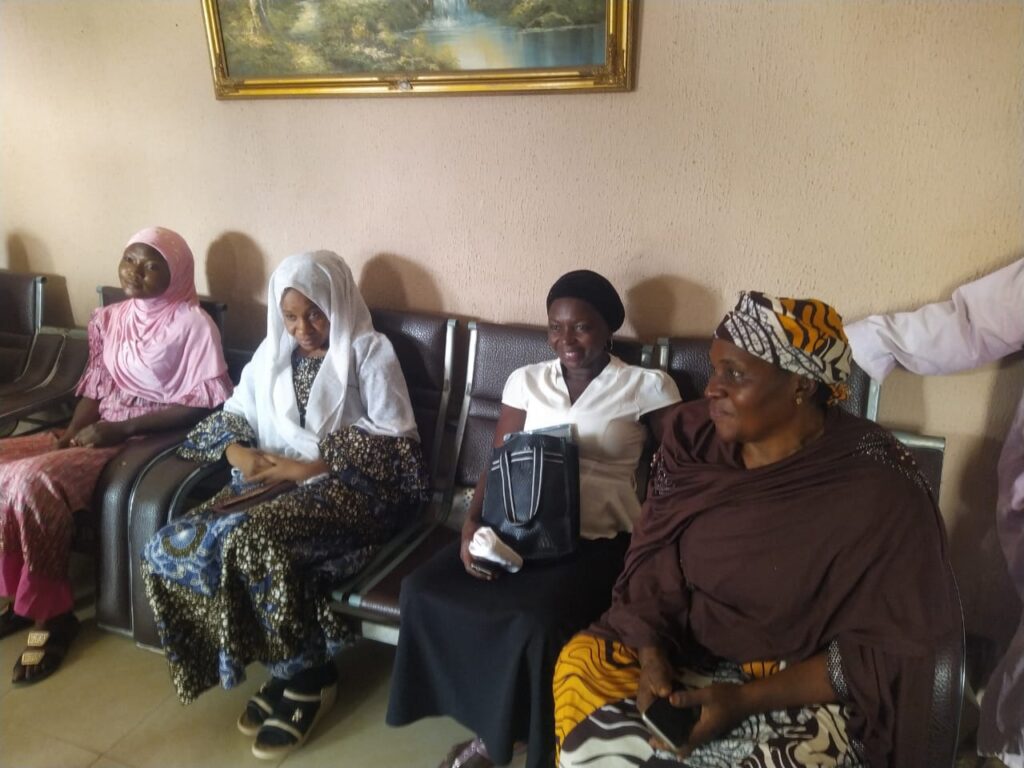
Presentation of Centre LSD research report on the Solid Mineral Development in Nigeria: Evidence from Ebonyi Ekiti and Taraba States with support of OSIWA to the Lamdo Gashaka by the Executive Director Centre LSD Mr Monday Osasah
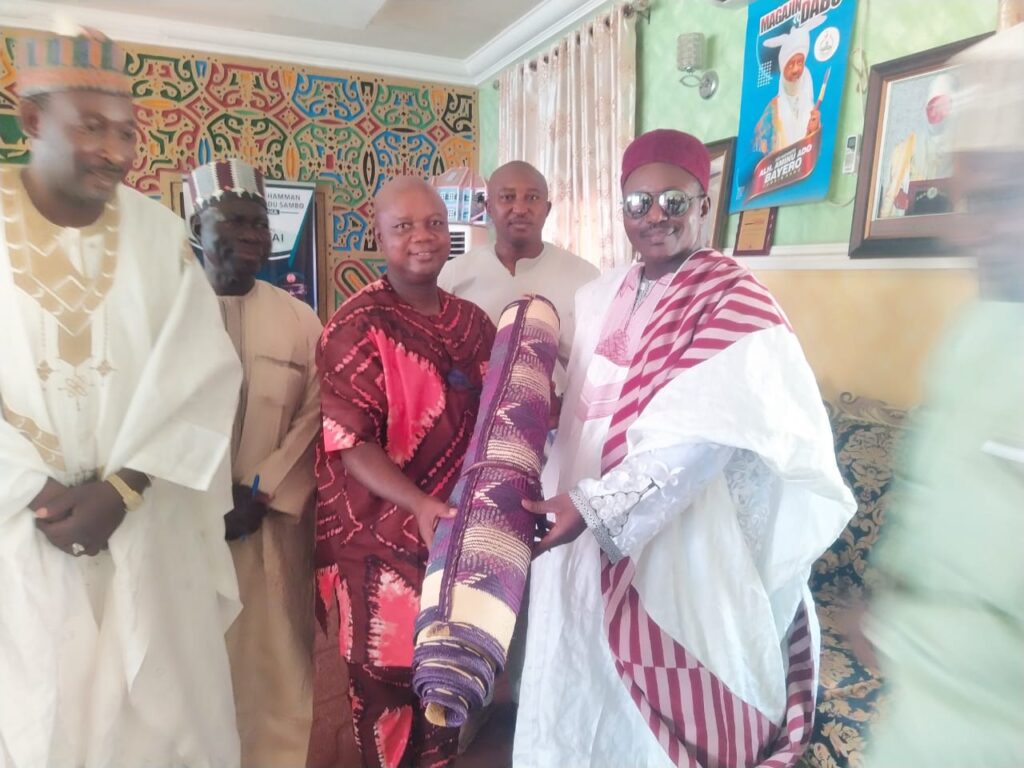
The Centre LSD advocacy team also met with WIMIN leadership at the Lamdo Gashaka guest house.
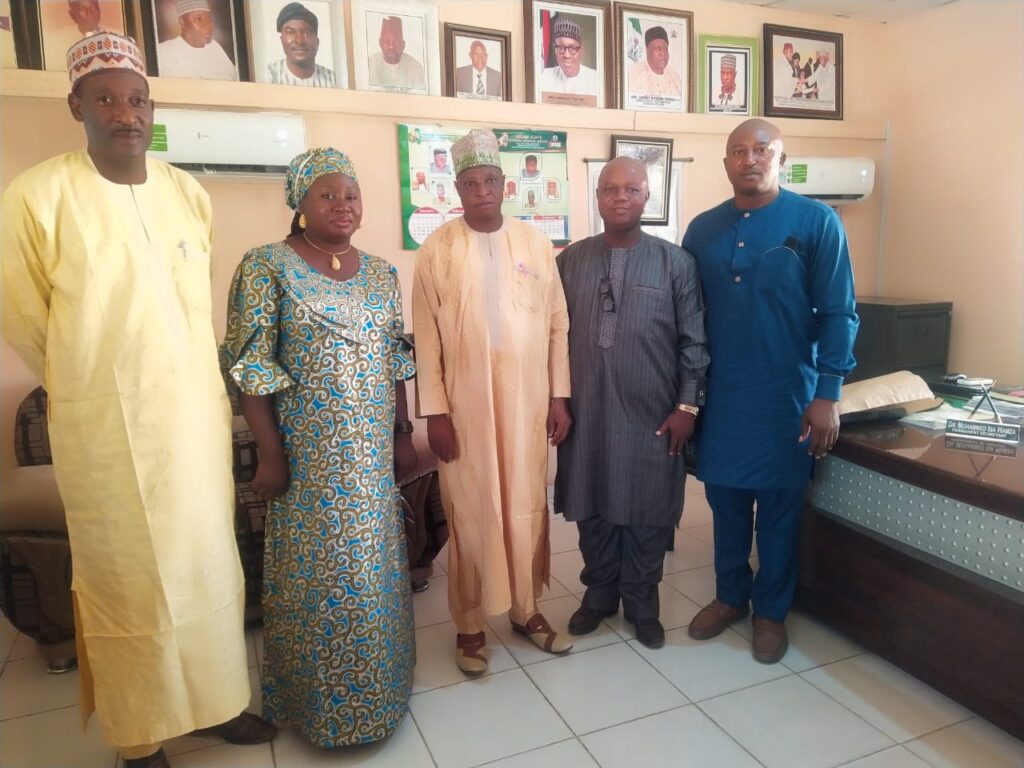
Advocacy visit to the Taraba State Ministry of Environment. Centre LSD team was received by the Permanent Secretary of the Ministry Dr Isah Mohammed Hamza. Hamza praised Centre for its good works and committee to adding his voice to the need for the establishment of MIREMCO by the State Governor.